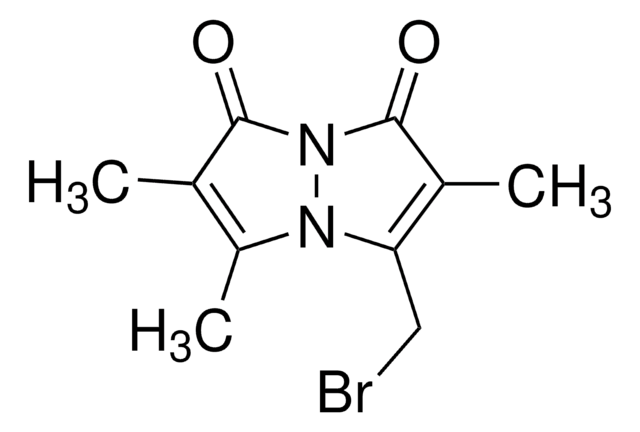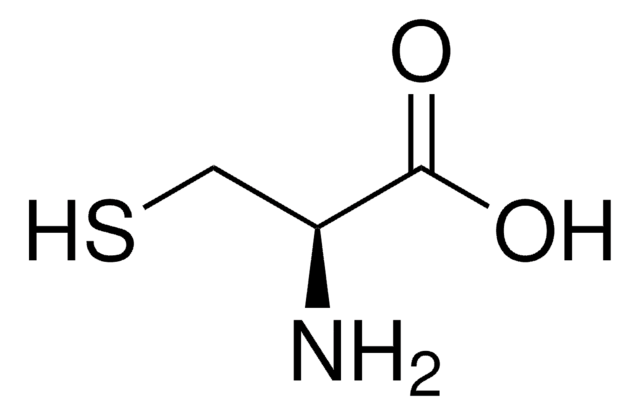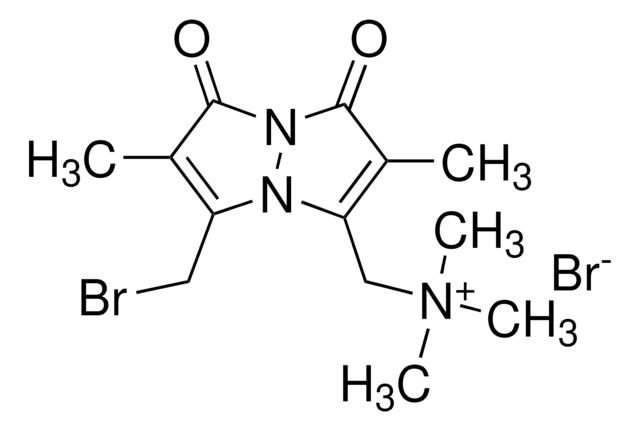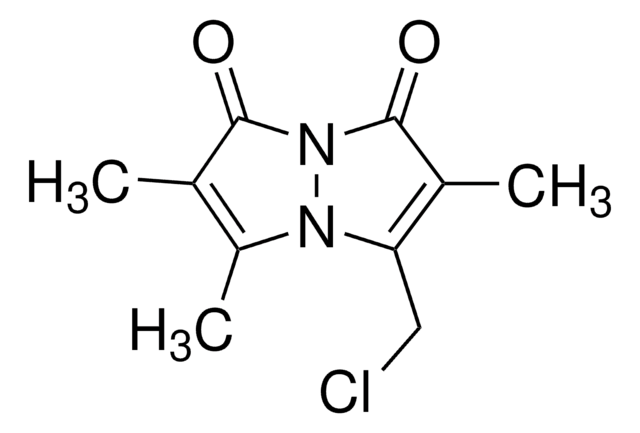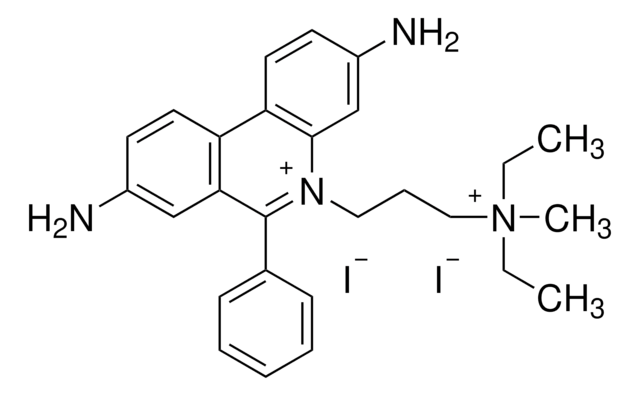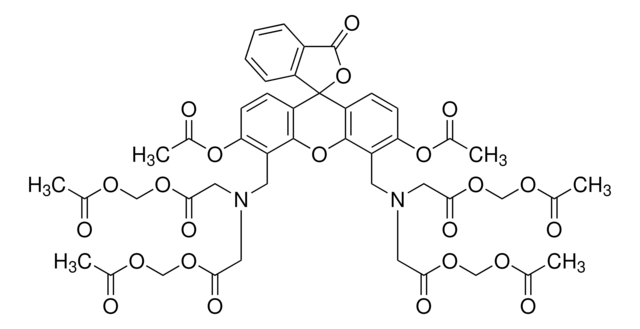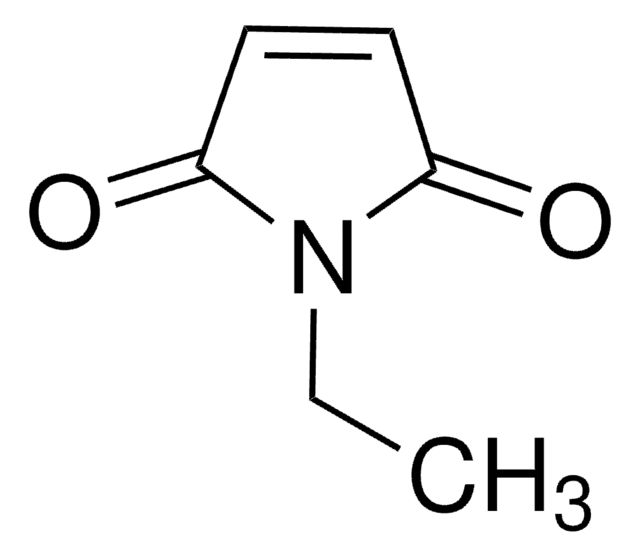추천 제품
제품 라인
BioReagent
Quality Level
분석
≥95% (HPCE)
양식
solid
mp
152-154 °C (lit.)
solubility
DMF: soluble
DMSO: soluble
acetonitrile: soluble
methanol: soluble
형광
λex 390 nm; λem 478 nm in 0.1 M phosphate pH 7.5 (after derivatization with glutathione)
λex 398 nm
적합성
suitable for fluorescence
저장 온도
2-8°C
SMILES string
CC1=C(C)C(=O)N2N1C(CBr)=C(C)C2=O
InChI
1S/C10H11BrN2O2/c1-5-7(3)12-8(4-11)6(2)10(15)13(12)9(5)14/h4H2,1-3H3
InChI key
AHEWZZJEDQVLOP-UHFFFAOYSA-N
유사한 제품을 찾으십니까? 방문 제품 비교 안내
일반 설명
Bromobimane, also called probe for thiols, is a fluorescent reagent activated upon a photolysis reaction. Bromobimane in solution reacts with small thiol groups (e.g., GSH) and with reactive protein thiol groups (e.g., hemoglobin). The reaction of Bromobimane with thiols is of second-order and dependent on pH. And, upon reacting with thiolate, it activates the water-soluble fluorescent product for detection.
애플리케이션
Bromobimane is used for the determination of thiols by the HPLC method. It is suitable as a pre-column derivatization agent for fluorometric determination of 2,3-dimercaptopropane-1-sulfonic acid and other dithiols. Bromobimane has been used as a fluorescent label in studying oligomycin-sensitive ATPase from beef heart mitochondria.
특징 및 장점
The benefits of using Bromobimane for the analysis of low molecular weight thiols are: Highly selective.
- Rapid reactivity.
- Ease of separation of derivatives by reverse HPLC.
- Ability to penetrate cells.
포장
Bottomless glass bottle. Contents are inside inserted fused cone.
기타 정보
Fluorescent thiol-specific reagent
Storage Class Code
11 - Combustible Solids
WGK
WGK 3
Flash Point (°F)
Not applicable
Flash Point (°C)
Not applicable
개인 보호 장비
Eyeshields, Gloves, type N95 (US)
이미 열람한 고객
P C Chinn et al.
Analytical biochemistry, 159(1), 143-149 (1986-11-15)
A highly sensitive and specific assay for Escherichia coli thioredoxin was developed using the thiol-specific reagent monobromobimane. Treatment of dithiothreitol-reduced thioredoxin with an excess of monobromobimane in Tris buffer (pH 8.0, 23 degrees C) for 30 min resulted in the
R M Maiorino et al.
Journal of chromatography, 374(2), 297-310 (1986-01-24)
The increasing therapeutic use of dithiol metal binding agents, such as 2,3-dimercaptopropane-1-sulfonic acid (DMPS), has stimulated the need for a sensitive and selective method for their determination in biological fluids. A method has now been developed in which DMPS was
Xiao Jie Yao et al.
Proceedings of the National Academy of Sciences of the United States of America, 106(23), 9501-9506 (2009-05-28)
G protein-coupled receptors (GPCRs) mediate the majority of physiologic responses to hormones and neurotransmitters. However, many GPCRs exhibit varying degrees of agonist-independent G protein activation. This phenomenon is referred to as basal or constitutive activity. For many of these GPCRs
Justin W Taraska et al.
Proceedings of the National Academy of Sciences of the United States of America, 106(38), 16227-16232 (2009-10-07)
The structure and dynamics of proteins underlies the workings of virtually every biological process. Existing biophysical methods are inadequate to measure protein structure at atomic resolution, on a rapid time scale, with limited amounts of protein, and in the context
Edward A Wintner et al.
British journal of pharmacology, 160(4), 941-957 (2010-07-02)
Hydrogen sulphide (H(2)S) is a labile, endogenous metabolite of cysteine, with multiple biological roles. The development of sulphide-based therapies for human diseases will benefit from a reliable method of quantifying H(2)S in blood and tissues. Concentrations of reactive sulphide in
자사의 과학자팀은 생명 과학, 재료 과학, 화학 합성, 크로마토그래피, 분석 및 기타 많은 영역을 포함한 모든 과학 분야에 경험이 있습니다..
고객지원팀으로 연락바랍니다.